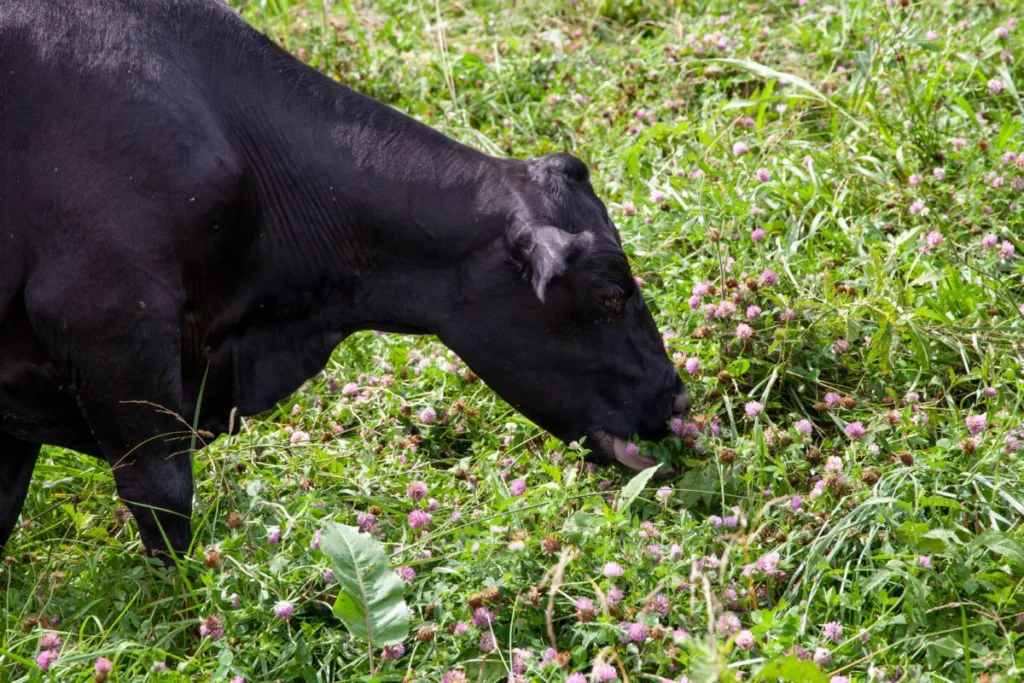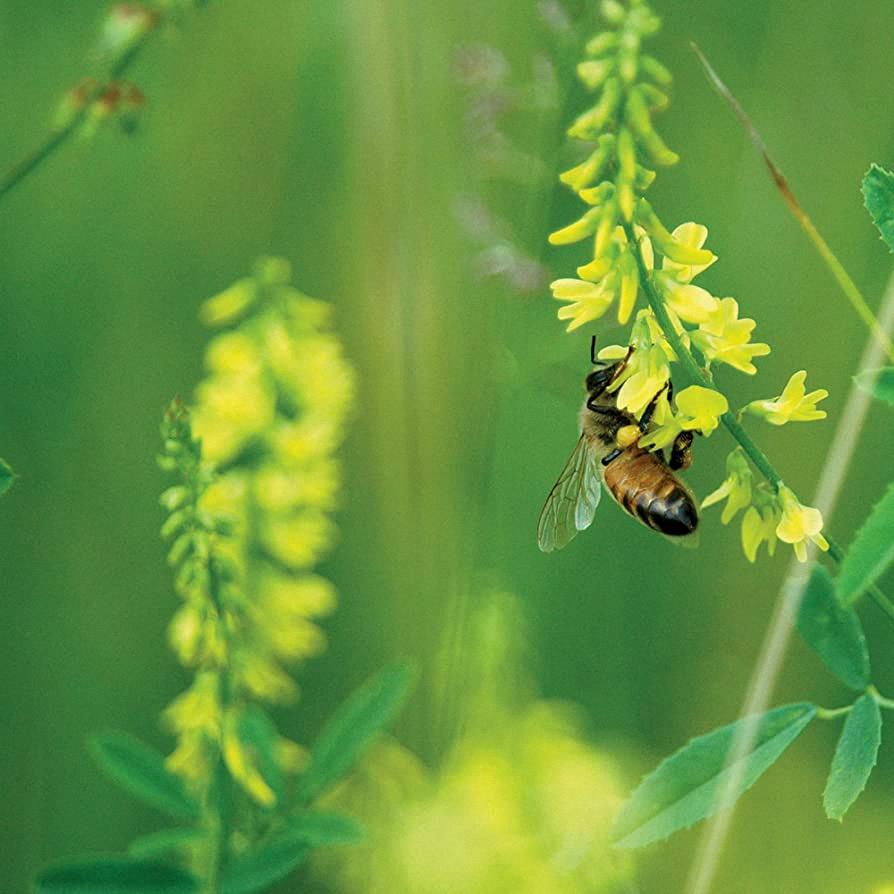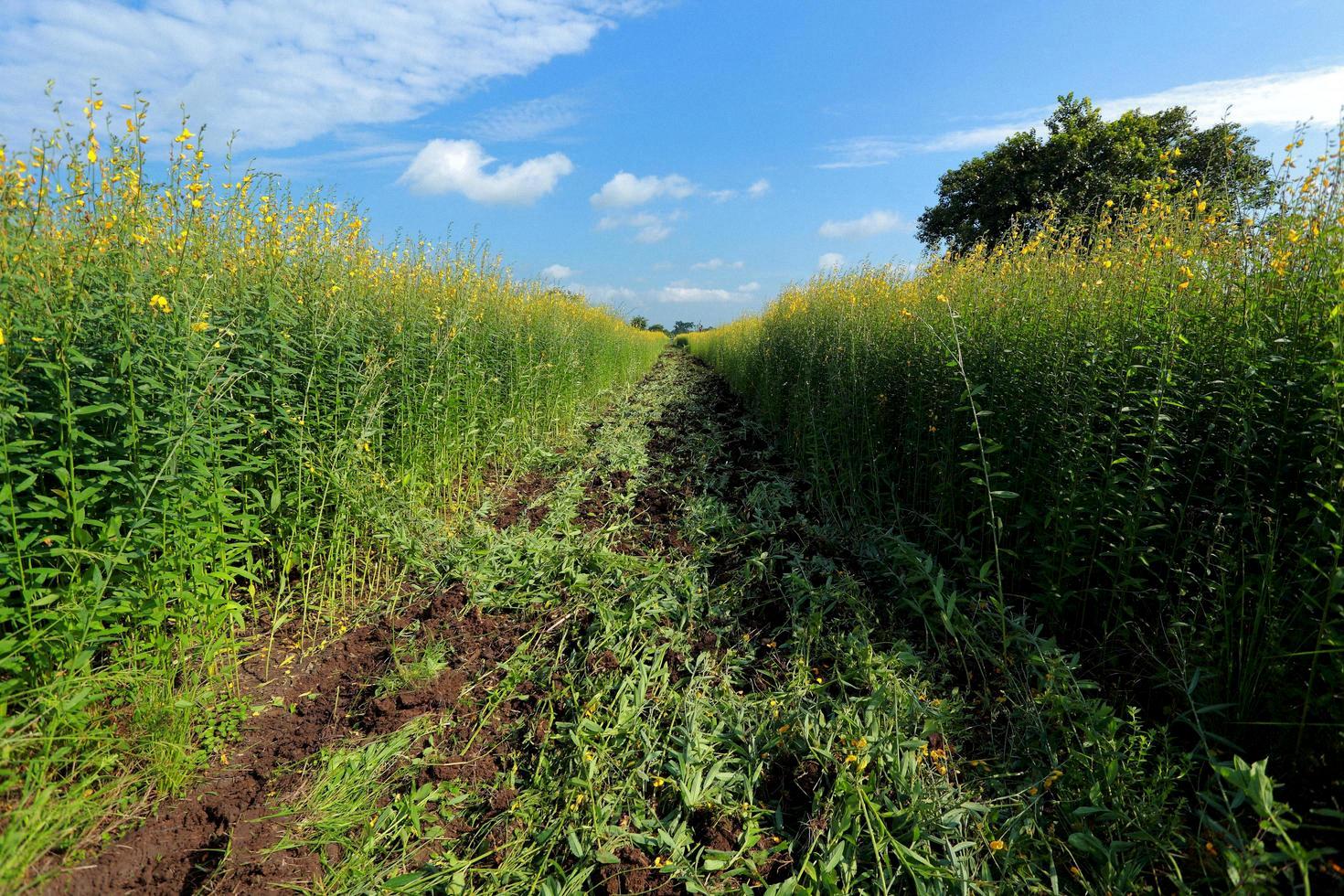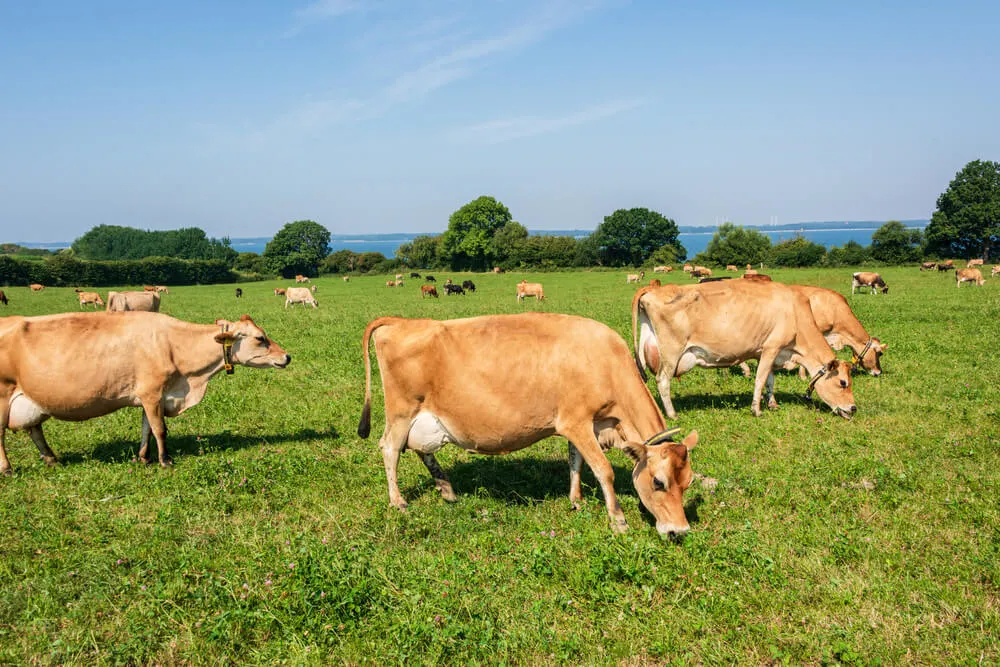Clover is a commonly found plant that is often used as a forage crop for livestock. While clover can provide a range of benefits, it can also pose a significant risk to cattle if not managed properly. In particular, cerain varieties of sweet clover can cause severe and often fatal hemorrhages in livestock such as cattle, sheep, and goats.
When sweet clover is improperly cured, it can develop a high concentration of the compound dicoumarol. This toxin prevents normal blood clotting, leading to internal hemorrhaging and associated symptoms. In severe cases, this can lead to death.
Symptoms of sweet clover poisoning in cattle usually appear within a few days of the animal consuming the contaminated feed. The initial signs of poisoning include lethargy, loss of appetite, and pale gums. As the condition progresses, the animal may develop respiratory distress, rapid heartbeat, and difficulty standing. If left untreated, the animal may ultimately succumb to the hemorrhaging and associated organ failure.
While sweet clover poisoning is a serious concern for cattle producers, it is important to note that not all clover varieties are toxic. In fact, many clovers can provide a range of benefits to livestock, including improved gains and conception rates. Red clover, white clover, and alfalfa are all popular forage crops that are generally safe for cattle to consume.
To avoid the risk of sweet clover poisoning, it is important to properly manage clover crops. This includes testing forage for dicoumarol levels, avoiding overgrazing, and ensuring proper curing and storage of hay. Additionally, it is important to monitor cattle closely for any signs of illness or distress and seek veterinary care if any concerns arise.
While sweet clover poisoning can be a serious threat to cattle health, proper management and care can minimize the risk of exposure. By taking steps to ensure the safety of forage crops and closely monitoring livestock, cattle producers can help protect their herds from this and other potential health hazards.
Can Cows Die From Eating Clover?
Cows can die from eating certain varieties of clover, specifically white and yellow sweet clover. These types of clover contain a chemical compound called coumarin, which can be converted to dicoumarol by certain molds that can grow on the plant during the curing process. Dicoumarol is a potent anticoagulant that can case severe hemorrhages in livestock if ingested in large amounts. The risk of dicoumarol poisoning is highest when hay made from sweet clover is improperly cured or stored, as mold growth can occur in these conditions. Symptoms of sweet clover poisoning in cows include lethargy, weakness, difficulty breathing, pale gums, and bloody urine or feces. In severe cases, the animal may die from excessive bleeding or organ failure. It is important for farmers to properly monitor their livestock’s diet and avoid feeding them hay made from sweet clover that has not been properly cured or stored.

Clover as a Cattle Killer: Investigating the Reasons for Clover-Related Cattle Deaths
Clover, particularly red clover, white clover, and alfalfa, contain compounds that cause bloating in cows. When cows eat these legumes, they produce a lot of gas in their rumen, which can become trapped and form foam. As the foam builds up, it can cause the cow’s rumen to expand and press against their diaphragm, making it difficult for them to breathe. If the bloating is not relieved, it can lead to death. Therefore, it is essential to manage the intake of clover and other bloat-causing legumes in cows to prevent this deadly condition.
The Benefits of Clover in a Cow Pasture
Clover is beneficial in a cow pasture. Clover is a legume that is often added to grass pastures to improve the nutritional value of the forage. It has been shown to increase animal gains and conception rates in cows. Clovers are more digestible than grasses, which means that cows can extract more nutrients from the forage. Additionally, clovers contain more protein and minerals, such as calcium and phosphorus, which are important for animal health and growth. adding clover to a cow pasture can improve the quality of the forage and lead to healthier and more productive cattle.
Is Clover Poisonous to Livestock?
Sweet clover can be poisonous to livestock. The plant contains a toxic compound known as dicoumarol which prevents normal blood clotting, leading to hemorrhages and associated symptoms. When ingested by livestock, this can lead to serious health problems and even death. The severity of sweet clover poisoning can vary depending on the amount of dicoumarol ingested, the duration of exposure, and the animal species affected. Therefore, it is important for livestock owners to be aware of the potential risks associated with sweet clover and take appropriate measures to prevent their animals from consuming it.
Effects of Eating Clover on Cows
When cows eat clover forage, it can lead to a condition called bloat. Bloat occurs due to the fermentation of clover in the cow’s stomach. This fermentation process produces a large amount of gas which can cause the cow’s stomach to distend and become swollen. This can lead to serious health problems such as difficulty breathing, reduced blood flow to vital organs, and even death in severe cases. Therefore, it is important for farmers and ranchers to monitor the amount of clover forage their cows consume to prevent bloat and ensure the health and well-being of their animals.

Source: amazon.com
The Dangers of Feeding Cows Alfalfa
Actually, cows can eat alfalfa, and it is a common feed for them. However, there are some concerns when feeding alfalfa to cows, especially when it is in the form of fresh pasture or hay. Alfalfa is a legume that is rich in protein and other nutrients, which can be beneficial for cows. However, it can also cause health problems, such as bloat, if cows eat too much of it too quickly. Bloat occurs when gas accumulates in the cow’s rumen, causing it to expand and potentially lead to death if not treated promptly. Therefore, farmers must be careful when feeding alfalfa to cows and shoud monitor their intake to prevent bloat. It is also important to note that alfalfa can be high in calcium, which can lead to urinary stones in some cows if fed excessively. However, when fed in moderation and with proper management, alfalfa can be a nutritious and valuable feed for cows.
The Dangers of Eating Toxic Grass for Cows
There are cerain types of grass that can produce toxins that are harmful to cows, and in some cases can even lead to death. One of the most common culprits is a type of grass called Johnsongrass, which is a variety of Sorghum grass. However, it’s important to note that any type of grass can potentially produce toxins if it undergoes certain conditions that cause stress to the plant. These toxins can take the form of either nitrates or prussic acids, and can build up in the grass over time. It’s crucial for farmers to keep a close eye on their cattle and the grass they are consuming, and to take any necessary precautions to prevent the buildup of these harmful toxins.
The Impact of Clover on Bloating in Cows
Clover is a legume commonly used as pasture for grazing livestock. However, clover can cause bloat in cows. The likelihood of clover causing bloat depends on the specific type of clover. White clover and alfalfa have the highest likelihood of causing bloat in cows. Red clover and crimson clover are moderately likely to cause bloat, while berseem clover is low risk for causing bloat. It is important to note that while clover can cause bloat, not all cows are equally susceptible. Some cows may be more prone to bloat than others, and factors such as diet and management practices can also play a role. To prevent bloat, farmers can manage their pastures by rotating grazing and providing access to hay or oter types of forage. They can also supplement with bloat-preventing agents such as poloxalene or ionophores. while clover can cause bloat in cows, with proper management and preventative measures, farmers can reduce the risk and ensure the health of their livestock.

Source: vecteezy.com
Toxic Plants for Cows
There are several plants that are toxic to cows and can cause health issues or even death. One such plant is the oleander, which contains a toxin that affects the heart and can cause death within a few hours of ingestion. Another toxic plant is the yew, which contains a compound that can cause sudden death due to heart failure. Additionally, the bracken fern can cause cancer in cows if eaten in large quantities over a long period of time. Other toxic plants include the nightshade, which can cause neurological symptoms, and the black locust, which can cause digestive issues and respiratory distress. It is important for farmers to be aware of these plants and take steps to prevent cows from grazing on them. This can include removing the plants from the pasture or providing alternative grazing areas.
The Benefits of Planting Clover in Pastures
Planting clover in your pasture can be a great decision for several reasons. Adding clovers to grass pastures can improve animal performance and increase the nutritional quality of the forage. Clover is a legume, which means it can fix nitrogen from the air and convert it into a form that plants can use. This can reduce or eliminate the need for nitrogen fertilizer, saving you money and reducing environmental impacts. Clover also extends the grazing season, as it typically grows earlier and latr in the year than many grasses. This means you can keep your animals on pasture longer, reducing your feed costs. Additionally, clover can help prevent erosion and improve soil health by adding organic matter to the soil. planting clover in your pasture can offer many benefits and can be a great investment in the long-term health and productivity of your forage system.
Can Horses and Cows Eat Clover?
Both horses and cows can eat clover. Clover is a nutritious forage that provides valuable energy, protein, and fiber for these animals. In fact, clover is oftn included in their diets in the form of hay or pasture. However, it is important to note that clover can sometimes develop molds which can lead to health issues in horses and cows. These molds can cause slobbers, photosensitivity, and bleeding. Therefore, it is important to ensure that clover is free from molds and is properly dried before feeding it to horses and cows. Additionally, while clover is generally safe for most horses and cows, it is always a good idea to consult with a veterinarian or an animal nutritionist to ensure that it is a suitable feed for your specific animal, especially if they have any underlying health conditions.

Conclusion
Clover can be both beneficial and harmful to livestock depending on the variety and the way it is handled. While clovers such as red, white, and alfalfa can improve animal gains and conception rates due to their high nutrient content, they can also cause bloat if not managed properly. On the other hand, sweet clover varieties such as white and yellow can lead to severe and often fatal hemorrhages in livestock if improperly cured. It is important for livestock owners to be aware of the potential risks associted with clover and to take appropriate precautions to ensure the health and well-being of their animals. With proper management and care, clovers can be a valuable addition to livestock feed and nutrition.
